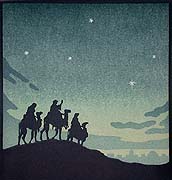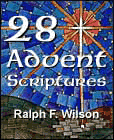
|
Old Testament
New Testament
Gospels
Acts
Paul's Letters
General Letters
Revelation
Topical Studies
Beginning the Journey (for new Christians). en Español

|
Old Testament
New Testament
Gospels
Acts
Paul's Letters
General Letters
Revelation
Topical Studies

|
Home
Bible Studies
Articles
Books
Podcasts
Search
Menu
Donate
About Us
Contact Us
FAQ
Sitemap
Day 23. Gold, Frankincense, and Myrrh (Matthew 2:7-12)
Monday (following the Fourth Sunday in Advent)
 'The Wisemen' (c. 1925), by Australian woodcut artist John Hall Thorpe (1847-1947), color woodcut, 7-7/8 x 7-1/2 in. |
Read in your Bible: Matthew 2:7-12
The Wise Men have arrived and put both Jerusalem and King Herod into a frenzy (Day 22). Now they go to find the true King.
Herod's Plot (Matthew 2:7-8)
"Then Herod called the Magi secretly and found out from them the exact time the star had appeared. He sent them to Bethlehem and said, 'Go and make a careful search for the child. As soon as you find him, report to me, so that I too may go and worship him.'" (Matthew 2:7-8)
Herod finds out precisely when the star appeared and later uses this information to slaughter all the boy babies in Bethlehem two years and under (Matthew 2:16, Day 24). Apparently the Magi had seen the sign a year or two previous to arriving in Jerusalem. Now Herod seeks to enlist the Magi as his secret agents: "As soon as you find him, report to me..." (Matthew 2:8).
Led by the Star (Matthew 2:9-10)
"After they had heard the king, they went on their way, and the star they had seen in the east went ahead of them until it stopped over the place where the child was. When they saw the star, they were overjoyed." (Matthew 2:9-10)
It seems that they had seen the star "at its rising" (or "in the East") and had come to Jerusalem, since that is where they expected to find a newborn King of the Jews. (Day 22.) But now the star, which seems to have disappeared for a while, reappears and "went ahead of them."173 Finally it "stopped" (NIV, NRSV) or "stood" (KJV) over the place where the child was."174 It isn't behaving like any normal star or constellation or comet or conjunction of planets we know anything about. This star is sent by God. The star that inspires their trip in the first place now leads them directly to the very home where the Christ-child dwells.
Worshipping the King (Matthew 2:11a)
"On coming to the house, they saw the child
with his mother Mary,
and they bowed down and worshiped him." (Matthew 2:11a)
By this time, a year or two after Jesus' birth, Mary and Joseph are living in a house.175 While most nativity scenes have shepherds bumping into wise men and angels, this almost certainly was not the case. The Holy Family has left the stable and found a house. Probably Joseph has found employment as a carpenter. They haven't returned to Nazareth, perhaps because of the scandal over Mary's pregnancy prior to marriage. Even though Joseph publicly acknowledged the child as his own, premarital relations were considered a sin in Judaism; the couple would have had to deal with considerable antagonism. And God needs them to be found here in Bethlehem.
But now, outside their home, a caravan of exotic travelers has stopped. Strangely dressed men are approaching while their camels are attended by servants. Other servants carry gifts in their hands. Mary scurries around to straighten up while Joseph goes out to meet the strangers.
We're not told the details, of course, but when the Magi see the child, now a toddler, they bow down176 and worship177 him. Imagine these old men, finely dressed, prostrating themselves on a dirt floor before a small child. They have seen the star and it has reappeared to guide them. These men are convinced -- rightly -- that they are standing before the Messiah, the King of the Jews. Their obeisance is fitting.
Offering Gifts to the King (Matthew 2:11b)
After lying prostrate for some time, they rise, perhaps at the urging of Joseph.
"Then they opened their treasures and presented him with gifts of gold and of incense and of myrrh." (Matthew 2:11b)
When foreign dignitaries would appear before a great king they would bring gifts as a sign of obeisance and honor. "Treasures" (NIV, KJV) is probably better translated "treasure chests" (NRSV).178 And as the lids are lifted, the glitter of gold and aroma of precious spices fill the room.
Gold, of course, was the most precious and valued metal known. It was highly prized. It was not found in Palestine, but imported from the mines of Ophir and elsewhere.179
Frankincense is derived from three species of the genus Boswellia that grow in southern Arabia, India, and elsewhere. The gum is exuded from the incised bark in pale glittering drops. It has a bitter flavor and a strong balsamic odor when heated. The Egyptians used it for fumigation and embalming; the Israelites used it in worship in the Holy Place of the tabernacle and temple (Exodus 30:34).180
Myrrh is valuable as a perfume and a constituent of sacred anointing oil (Exodus 30:23). Several shrubs produce a perfumed resinous substance described as myrrh, but the one compounded in the anointing oil was probably from Commiphora myrrha or perhaps Balsamodendron myrrha, a low thorny tree distributed across south Arabia and Ethiopia. The sap is pleasantly scented and dries into a solid resin that can be diluted to form a liquid cosmetic product, perhaps used by Egyptians in embalming.181
These may seem to us inappropriate gifts for a baby, but as munificent gifts from distinguished personages appearing before a king, they would be considered quite appropriate, perhaps as specimens of the products of their country.182 Later Christian writers have seen significance in gold for Christ's royalty, frankincense for his deity, and myrrh for his humanity,183 ultimately his burial, though none of this is in Matthew's account.184 I can't help think of the song "The Little Drummer Boy" (1958):
"I have no gift to bring ... that's fit to
give the King ...
I played my drum for Him ... I played my best for Him ...
Then He smiled at me ... me and my drum."185
The song is popular; the sentiment profound. Our best, no matter how seemingly insignificant, is what we owe the King. That is what characterizes the Magi's gifts.
Though the Magi's quest has brought Herod's scrutiny upon the child, these gifts were probably sold gradually to provide for the Holy Family during three years of exile in Egypt where they flee to escape Herod's wrath (Day 24)).
Avoiding Herod (Matthew 2:12)
The passage concludes with another sign from God directing the Wise Men's path.
 Also available in book formats: PDF, Kindle, and paperback. |
"And being warned in a dream not to return to Herod, they departed to their own country by another way." (Matthew 2:12)
The battle between Light and darkness continues. But God's warning delays it for a few days. And at the same time Joseph too is warned in a dream to flee. God has a plan for his Child.
Prayer
Bowing before Jesus and offering him whatever gifts I can is the essence of worship. So, Lord Jesus, I bow before you. Whatever you can use of what you've made me to be, I offer to you. It is my joy to be used by you. As the infant Christ Child smiled at the sight of the Magi's gifts, it is my desire to bring a smile to your face. In your holy name, I pray. Amen.
Discussion Question
Q23. (Matthew 2:7-12) Does gift-giving on this occasion
involve love or mere custom? How were the Magi's gifts fitting for the Christ
Child? What gifts can you offer Jesus that mean something? What gifts
demonstrate your love?
https://www.joyfulheart.com/forums/topic/2098-q23-gifts/
Endnotes
[173] Proagō means "to move ahead or in front of, go before, lead the way, precede" (BDAG 864, 2a).
[174] Histēmi, "set, place," here means "to desist from movement and be in a stationary position, stand still, stop" (BDAG 482-483, B1).
[175] Oikia, "a structure used as a dwelling, house" (BDAG 695, 1.a.).
[176] Piptō, "fall," here "'fall down, throw oneself to the ground' as a sign of devotion or humility, before high-ranking persons or divine beings" (BDAG 81, 1bβαד).
[177] "Worship" (NIV, ESV, KJV) or "pay homage" (NRSV) is presume, literally, "kiss towards." It means "to express in attitude or gesture one's complete dependence on or submission to a high authority figure, (fall down and) worship, do obeisance to, prostrate oneself before, do reverence to, welcome respectfully" (BDAG 882-883).
[178] Thēsauros, "a place where something is kept for safekeeping, repository ... treasure box or chest." It can also mean that which is stored up, "treasure," but the context of opening here suggests the chest. We get our English word "thesaurus" from this word. (BDAG 456).
[179] George A. Turner and Ralph W. Vunderink, "Gold," ISBE 2:520-522.
[180] R.K. Harrison, "Frankincense," ISBE 2:360.
[181] R.K. Harrison, "Myrrh," ISBE 3:450-451.
[182] Edersheim, Life and Times 1:214.
[183] Including John H. Hopkins, Jr. who wrote "We Three Kings of Orient Are" (1857).
[184] Edersheim, Life and Times 1:214, fn. 1.
[185] "The Little Drummer Boy," by Katherine K. Davis, Henry Onorati and Harry Simeone. Copyright ©1958, EMI Mills Music Inc., International Korwin Corp. (ASCAP).
Copyright © 2026, Ralph F. Wilson. <pastor![]() joyfulheart.com> All rights reserved. A single copy of this article is free. Do not put this on a website. See legal, copyright, and reprint information.
joyfulheart.com> All rights reserved. A single copy of this article is free. Do not put this on a website. See legal, copyright, and reprint information.

